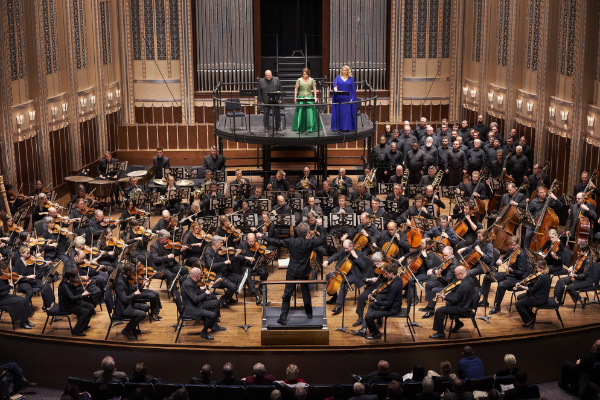
Courtesy of the Cleveland Orchestra
What do the Cleveland Orchestra and former assistant principal oboist Robert Zupnik have in common? At 100, they are both alive and very well, indeed!
Cleveland-born Bob Zupnik was already a year old when the Cleveland Orchestra presented its first concert in Gray’s Armory on December 11, 1918. Much later as a young college student, Bob played when needed as an extra in the orchestra, and in 1946 after serving in the Second World War, he returned to play as assistant principal oboe until his retirement in 1977.

The Author with Bob ZupnikCourtesy of the Author
“My mother was the music in my life,” said Bob, as he reminisced from his abode at Montefiore in Beachwood, Ohio, a suburb of Cleveland. “She had me start the violin at a very early age, and then around 13, I switched to the oboe. For just 50 cents, students could take lessons with Cleveland Orchestra members on Saturdays at John Hay High School right down the street from Severance Hall.” (Severance Hall has been home to the Cleveland Orchestra since it was built with John Long Severance’s money in 1931.)
One could say that not much has changed since those orchestra members gave lessons in the 1930s. This past year, in celebration of the Cleveland Orchestra’s 100th Anniversary, and as part of the Beethoven Prometheus Project, orchestra musicians worked with classes and gave individual lessons to students at the nearby Cleveland School of the Arts.
The orchestra musicians introduced the students to the many facets of Beethoven: Beethoven as the great composer, as a person with struggles and successes similar to those the students face today, as a revolutionary figure for positive change, and as an advocate for freedom, equality, and justice. In classes for music, dance, English, and visual arts, students learned that they can be catalysts for change and can influence and produce positive messages. Triumphantly, after many lessons and much hard work, a dozen young string players from the Cleveland School of the Arts played the Prometheus Overture in a side-by-side concert with Cleveland Orchestra members in Severance Hall.
It was the idea of current Music Director Franz Welser-Möst to use the image of Prometheus giving the gift of fire (the symbol of power and learning) as a metaphor for Beethoven’s works. Great expectations and excitement were in the air when, in May, the Cleveland Orchestra played his nine symphonies, four of his overtures and the Grosse Fuge in Cleveland and then on tour in Vienna and Tokyo in celebration of the orchestra’s 100 years of performances.
For the Cleveland Orchestra’s annual spring opera presentation, Franz chose Tristan and Isolde. He felt that Beethoven broke the mold and introduced the Romantic Era in music, while Wagner’s opera reached the apex of that same Romanticism and announced the start of our modern world. Franz believes that both the Beethoven series and the Wagner opera are perfect for TCO’s Centennial season, as “music makes history and at the same time leaves the past behind, taking us into the future.”

TCO’s performance of Tristan and Isolde, with Gerhard Siegel, Nina Stemme, and Okka von der Damerau
Roger Mastroianni, Courtesy of the Cleveland Orchestra
The orchestra’s greatest strength continues to be the citizens of the Cleveland area. Individuals and corporations finance the orchestra’s growth, while insisting on programs for educating and inspiring young students. Today, 20% of audience members are aged 25 or younger, and the orchestra is the beneficiary of the greatest generosity of any major American orchestra, measured by per capita donations.
So, the orchestra is definitely still going strong at 100, and so is Bob Zupnik. Although Bob no longer plays the oboe, he says he has become a singer. He demonstrated for me with perfect intonation and flawless rhythm, singing several well-known oboe passages, including Le Tombeau de Couperin, which he had played for George Szell at his audition in 1946.
Some of Bob’s reminiscences about George Szell and the orchestra are included in the recently published book George Szell’s Reign by Marcia Kraus, wife of Felix Kraus, the orchestra’s former second oboist and English horn player. When we discussed the book and his years in the orchestra, I asked Bob what he thought made the Cleveland Orchestra so great. His answer was quick and direct. “Putting the music first—total dedication. And listening to your colleagues!”
Bob is remembered in Cleveland Orchestra lore for being the perfect gentleman, always dressing sharply and acting professionally. At 100 he has a keen wit, a warm manner and a philosophical attitude toward life. Laughingly, Bob remembered when 51 years ago Orchestra members were taken on a bus out to view the 500 acres where Blossom Music Center, the summer home of the Cleveland Orchestra, was to be built. “It had been raining for several days, so it was just a BIG mud pit! They served us a bottle of beer. I guess they thought that would make up for the bad weather,” he said with a twinkle in his eye.
It will be fifty years ago this summer that Blossom Music Center was opened. Welser-Möst and the orchestra will celebrate that anniversary with the opening program on July 7, including another Beethoven work: the Triple Concerto, with this author as the pianist.
Celebrations for anniversaries are in abundance in Cleveland this year!





